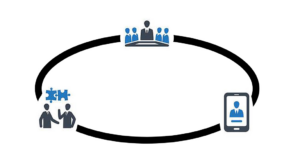Even though we like smart leaders, we find that they typically fail to create a psychologically safe environment around themselves. This is not necessarily a problem, it is just that they have to decide everything, and sooner or later it becomes a bottleneck. This is how a clever person becomes a barrier to progress.
A clever boss makes confident decisions based on what he knows. He has little doubt about his beliefs or his behaviour.
In contrast, the wise boss confidently decides based on what he knows and questions beliefs, assumptions and behaviour. Wise leaders know what they don’t know. They courageously build on the data and facts available at the time, while looking for signs of error. They think critically about their own opinions.
If you look closely, you can see the obvious differences between clever leaders and wise leaders:
- The clever one speaks in extremes, stating the unquestionable truth, while the wise one makes statements with room for uncertainty.
- The clever one answers questions (even those that have not yet been asked), the wise one asks questions.
- The clever leader speaks well, while the wise listens well.
- The clever leader helps but doesn’t ask and refuses help, whereas the wise one helps, asks for help and accepts it when it is offered.
- The clever typically defends and sticks to his ideas, expressing strong opinions, the wise casts doubt and revises his own ideas, expressing strong opinions but not sticking to them.
The best way to get information is by asking questions, yet, funnily enough, it is the least used approach. If we play smart all the time, colleagues will be reluctant or unwilling to give their opinion. It’s like a child playing quietly in a room: more suspicious than reassuring.
Understandably, it is not easy to ‘act wise’, as this often results in having to support potentially annoying initiatives. For example, allowing colleagues to question basic assumptions or even to upset entrenched work habits.
Yet how can we behave more wisely, how can we create a safer environment for colleagues?
I have put together some tips for you to see if they help:
- Don’t start fighting until everyone understands what the challenge is, what you are up against.
- Don’t argue while you are brainstorming ideas or solutions. Create a safe environment even for crazy ideas. You’ll throw out the bad ones once you’ve gathered a few.
- If colleagues are disagreeing with each other, stop for a moment and ask them to keep their voices down. Pay special attention to self-proclaimed standup comedians who insult others with their banter.
- Also listen to those who talk less and are therefore overshadowed. It’s not that they don’t give a sh…, they might just be more introverted. Politely mute those who talk a lot.
- Invite people to the meetings who will have to implement what you work out. Maybe they can tell you how it could be better for them. Or at least less bad.
- Ask more: What if…? Should we look at…? What data support…? Is there research that disproves or questions…?
- Don’t just listen to words, but also to non-verbal cues. Are they smiling? Are they really listening? Are they rolling their eyes? What are they not saying?
- Behind the scenes, calm down those who may have taken the discussion as a personal insult or whose ideas were voted down.
- Once the debate has been resolved, make sure the conflict and criticism has stopped. Leave no room for the victim role of “they shot down my idea”.
Despite all these efforts, of course, there will be some people who are too sensitive for the argument or who are just unpleasant characters. It may be advisable to leave them out of the fray, as they may be the very reason why a constructive discussion cannot unfold.
Act2Manage Application
An interactive, gamification-based, practice-oriented leadership development application that provides immediate help and enables follow-up to the most common dilemmas.







